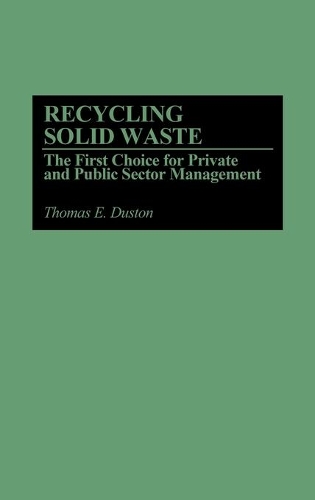
Recycling Solid Waste: The First Choice for Private and Public Sector Management
(Hardback)
Publishing Details
Recycling Solid Waste: The First Choice for Private and Public Sector Management
By (Author) Thomas E. Duston
Bloomsbury Publishing PLC
Praeger Publishers Inc
20th April 1993
United States
Classifications
Tertiary Education
Non Fiction
363.72
Physical Properties
Hardback
224
Width 156mm, Height 235mm
595g
Description
Recycling can be the first choice in many solid waste disposal situations according to Thomas Duston. In this timely and pathbreaking book, the author guides the reader carefully through the recycling process from trash to market, with a detailed description of how to figure both costs and benefits at each stage. The book emphasizes the crucial importance of careful planning for solid waste management. Extra attention is given to the often misunderstood concept of cost avoidance, as well as to the central role of materials processing in the handling, storage and marketing of recyclables. A unique feature is the inclusion of a separate chapter on the 10 questions you most likely will be asked. The questions and answers are extremely helpful to those working on recycling. They are derived from the author's extensive experience with many different audiences interested in, and often skeptical about, recycling. Extensive appendices are included, with useful lists of equipment sellers, trade association, educational materials, specialized recycling opportunities, and other important reference materials. The planning phase of setting up a recycling program consists of three separate areas requiring careful preparation: (1) Specific detail must be gathered on the materials content of one's own waste stream; (2) potential materials handling and processing equipment--balers, chippers, specialized trucks, granulators, etc.--must be researched and understood; and (3) the financial skills needed to estimate both costs and benefits must be developed. The first section of the book covers these crucial planning functions. Once this planning is done, then recycling implementation and evaluation---the middle section of the book---are very straightforward. Considerable practical advice on setting up a recycling plan with the best chance of success is the focus throughout these first two sections. The main objective of the book is to provide an invaluable first reference book for the practical management of almost any solid waste disposal situation. However, the last part of the book does provide a theoretical focus for those interested in either the microeconomics of recycling or the place of recycling within the larger framework of waste generation and disposal in a high- consumption society. This book can also be used as a supplement in college courses in environmental studies and resource management, as well as applied economics.
Reviews
This boldly conceived and well-written little book is a giant contribution to the field of solid waste recycling. With little or no background in recycling, the reader can understand why waste should be viewed as useful material; how a workable plan for processing, handling, storing, and maintaining the flow of these useful materials can be created; how these materials can be evaluated in a waste stream; and, literally, how a complex recycling plan can be established. One could start a recycling business with little more than this book as an intellectual resource. Federal, state, and local agencies need this book, concerned citizens will benefit greatly, and opportunities are offered to the entrepreneur. An amazing print resource on solid waste recycling. All levels.-Choice, December 1993
"This boldly conceived and well-written little book is a giant contribution to the field of solid waste recycling. With little or no background in recycling, the reader can understand why waste should be viewed as useful material; how a workable plan for processing, handling, storing, and maintaining the flow of these useful materials can be created; how these materials can be evaluated in a waste stream; and, literally, how a complex recycling plan can be established. One could start a recycling business with little more than this book as an intellectual resource. Federal, state, and local agencies need this book, concerned citizens will benefit greatly, and opportunities are offered to the entrepreneur. An amazing print resource on solid waste recycling. All levels."-Choice, December 1993
Author Bio
THOMAS E. DUSTON is currently Associate Professor of Economics at Keene State College of the University System of New Hampshire. He has a doctorate in economics as well as degrees in engineering, and paper mill management. He served as chairman of a committee which set up a recycling program in Chesterfield, New Hampshire, that is providing a 35 percent saving in the solid waste budget of that town. Various sections of this book have been well received when presented to professional audiences of the Eastern Economics Association and the American Public Health Association, as well as to state and local business and citizen's groups.
